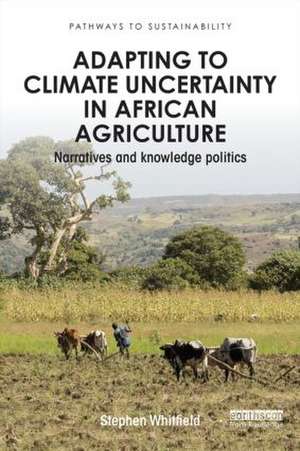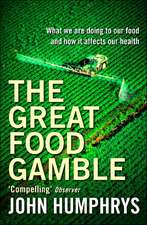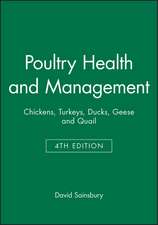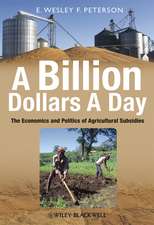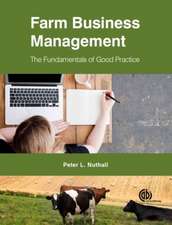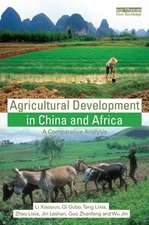Adapting to Climate Uncertainty in African Agriculture: Narratives and knowledge politics: Pathways to Sustainability
Autor Stephen Whitfielden Limba Engleză Paperback – 8 sep 2015
This book examines the challenges of adaptation in smallholder farming in Africa, analysing the social, economic, political and climatic uncertainties that impact on agriculture in the region and the range of solutions proposed. Drawing on case studies of genetically modified crops, conservation agriculture, and other 'climate smart' solutions in eastern and southern Africa, the book identifies how uncertainties are framed 'from above' as well experienced 'from below', by farmers themselves. It provides a compelling insight into why ideas about adaptation emerge, from whom, and with what implications.
This book offers a unique perspective and will be highly relevant to students of climate change adaptation, food security and poverty alleviation, as well as policy-makers and field practitioners in international development and agronomy.
| Toate formatele și edițiile | Preț | Express |
|---|---|---|
| Paperback (1) | 272.37 lei 6-8 săpt. | |
| Taylor & Francis – 8 sep 2015 | 272.37 lei 6-8 săpt. | |
| Hardback (1) | 1108.37 lei 6-8 săpt. | |
| Taylor & Francis – 4 sep 2015 | 1108.37 lei 6-8 săpt. |
Din seria Pathways to Sustainability
-
 Preț: 257.70 lei
Preț: 257.70 lei -
 Preț: 258.62 lei
Preț: 258.62 lei -
 Preț: 258.66 lei
Preț: 258.66 lei -
 Preț: 169.50 lei
Preț: 169.50 lei -
 Preț: 275.30 lei
Preț: 275.30 lei -
 Preț: 323.23 lei
Preț: 323.23 lei -
 Preț: 485.40 lei
Preț: 485.40 lei -
 Preț: 321.01 lei
Preț: 321.01 lei -
 Preț: 273.35 lei
Preț: 273.35 lei -
 Preț: 240.16 lei
Preț: 240.16 lei -
 Preț: 274.20 lei
Preț: 274.20 lei -
 Preț: 333.72 lei
Preț: 333.72 lei - 26%
 Preț: 762.97 lei
Preț: 762.97 lei -
 Preț: 334.57 lei
Preț: 334.57 lei -
 Preț: 273.57 lei
Preț: 273.57 lei -
 Preț: 322.27 lei
Preț: 322.27 lei -
 Preț: 274.45 lei
Preț: 274.45 lei - 18%
 Preț: 210.55 lei
Preț: 210.55 lei -
 Preț: 242.53 lei
Preț: 242.53 lei -
 Preț: 471.77 lei
Preț: 471.77 lei -
 Preț: 317.48 lei
Preț: 317.48 lei -
 Preț: 323.23 lei
Preț: 323.23 lei -
 Preț: 363.96 lei
Preț: 363.96 lei -
 Preț: 314.21 lei
Preț: 314.21 lei -
 Preț: 275.26 lei
Preț: 275.26 lei
Preț: 272.37 lei
Nou
Puncte Express: 409
Preț estimativ în valută:
52.12€ • 54.11$ • 43.46£
52.12€ • 54.11$ • 43.46£
Carte tipărită la comandă
Livrare economică 22 martie-05 aprilie
Preluare comenzi: 021 569.72.76
Specificații
ISBN-13: 9781138849334
ISBN-10: 1138849332
Pagini: 210
Ilustrații: 14 black & white illustrations, 6 black & white tables, 7 black & white halftones, 1 black & white line drawings
Dimensiuni: 156 x 234 x 15 mm
Greutate: 0.32 kg
Ediția:1
Editura: Taylor & Francis
Colecția Routledge
Seria Pathways to Sustainability
Locul publicării:Oxford, United Kingdom
ISBN-10: 1138849332
Pagini: 210
Ilustrații: 14 black & white illustrations, 6 black & white tables, 7 black & white halftones, 1 black & white line drawings
Dimensiuni: 156 x 234 x 15 mm
Greutate: 0.32 kg
Ediția:1
Editura: Taylor & Francis
Colecția Routledge
Seria Pathways to Sustainability
Locul publicării:Oxford, United Kingdom
Public țintă
PostgraduateCuprins
1. Narratives of Change in African Agriculture Part 1: Uncertainty from Above and Below 2. Constructing Uncertainty 'from Above': Knowledge and narratives of climate change adaptation 3. Constructing Uncertainty from Below: Continual adaptation in Kenyan smallholder farming Part 2: Technologies of Agricultural Change 4. Breeding for an Uncertain Future: The case of 'drought tolerant' and 'water efficient' maize for Africa 5. Ciritcal Perspectives on Conservation Agriculture in Zambia and Malawi 6. What is Climate 'Smartness'? A review of case studies of 'climate-smart agriculture' 7. Governing Adaptation in Africa's Agricultural Future
Recenzii
"No matter whether you agree with his framing of the issues or his conclusions, this book is essential reading for all working in the broad fields of agricultural research and development studies. Stephen Whitfield breaks new ground in a brave and timely ‘political agronomy’ analysis of the knowledge agenda relating to the impacts of climate variability and change on African smallholder agriculture. You will be challenged to rethink your own approaches and assumptions on issues central to future food production in Africa." –Ken Giller, Professor of Plant Production Systems, Wageningen University, Netherlands
"There is a lot of abstract theorising around climate adaptation in the developing world; and competing claims are made about what knowledge or technology is most needed. Stephen Whitfield's Adapting to Climate Uncertainty in African Agriculture is a rich empirical study of what actually happens on the ground among small-scale Kenyan farmers. Woven together through following the thread of knowledge, his arresting account shows that uncertainty, ambiguity and ignorance are the currency of climate adaptation, as much for climate-crop modellers and biotech companies as for the farmers themselves. Whitfield shows that knowledge is only useful when its limitations are exposed." –Mike Hulme, Professor of Climate and Culture, King's College London, UK
"Risk, uncertainty, ignorance, ambiguity –these are not simple words of speech but rather conditions of incomplete knowledge. In a lucid analysis of problem-solution storylines of climate impact, the author reveals assumptions that govern high level science and the everyday adaptation of farmers. The book begins with the analysis of the social context within which knowledge bases are framed and, through case studies, moves to unpack climate-crop science and the local knowledge of farmers. Recognising the gaps in both knowledge bases, this book calls for an integrated and participatory approach to climate change. Deeply thought-provoking, the book is an important guide for innovative thinkers in the design and implementation of climate smart agriculture in Africa." –Hannington Odame, Executive Director, Centre for African Bio-Entrepreneurship; and Regional Coordinator, East African Hub, Future Agricultures Consortium, Nairobi, Kenya
"There is a lot of abstract theorising around climate adaptation in the developing world; and competing claims are made about what knowledge or technology is most needed. Stephen Whitfield's Adapting to Climate Uncertainty in African Agriculture is a rich empirical study of what actually happens on the ground among small-scale Kenyan farmers. Woven together through following the thread of knowledge, his arresting account shows that uncertainty, ambiguity and ignorance are the currency of climate adaptation, as much for climate-crop modellers and biotech companies as for the farmers themselves. Whitfield shows that knowledge is only useful when its limitations are exposed." –Mike Hulme, Professor of Climate and Culture, King's College London, UK
"Risk, uncertainty, ignorance, ambiguity –these are not simple words of speech but rather conditions of incomplete knowledge. In a lucid analysis of problem-solution storylines of climate impact, the author reveals assumptions that govern high level science and the everyday adaptation of farmers. The book begins with the analysis of the social context within which knowledge bases are framed and, through case studies, moves to unpack climate-crop science and the local knowledge of farmers. Recognising the gaps in both knowledge bases, this book calls for an integrated and participatory approach to climate change. Deeply thought-provoking, the book is an important guide for innovative thinkers in the design and implementation of climate smart agriculture in Africa." –Hannington Odame, Executive Director, Centre for African Bio-Entrepreneurship; and Regional Coordinator, East African Hub, Future Agricultures Consortium, Nairobi, Kenya
Descriere
This book examines the challenges of adaptation in smallholder farming in Africa, analysing the social, economic, political and climatic uncertainties that impact on agriculture in the region and the range of solutions proposed. Drawing on case studies of genetically modified crops, cash-crop alternatives to maize, and conservation agriculture in eastern and southern Africa, the book identifies how uncertainties are framed ‘from above’ as well experienced ‘from below’, by farmers themselves. It draws out conclusions that will be highly relevant for research and humanitarian investments, as well as national and international agricultural policies.
